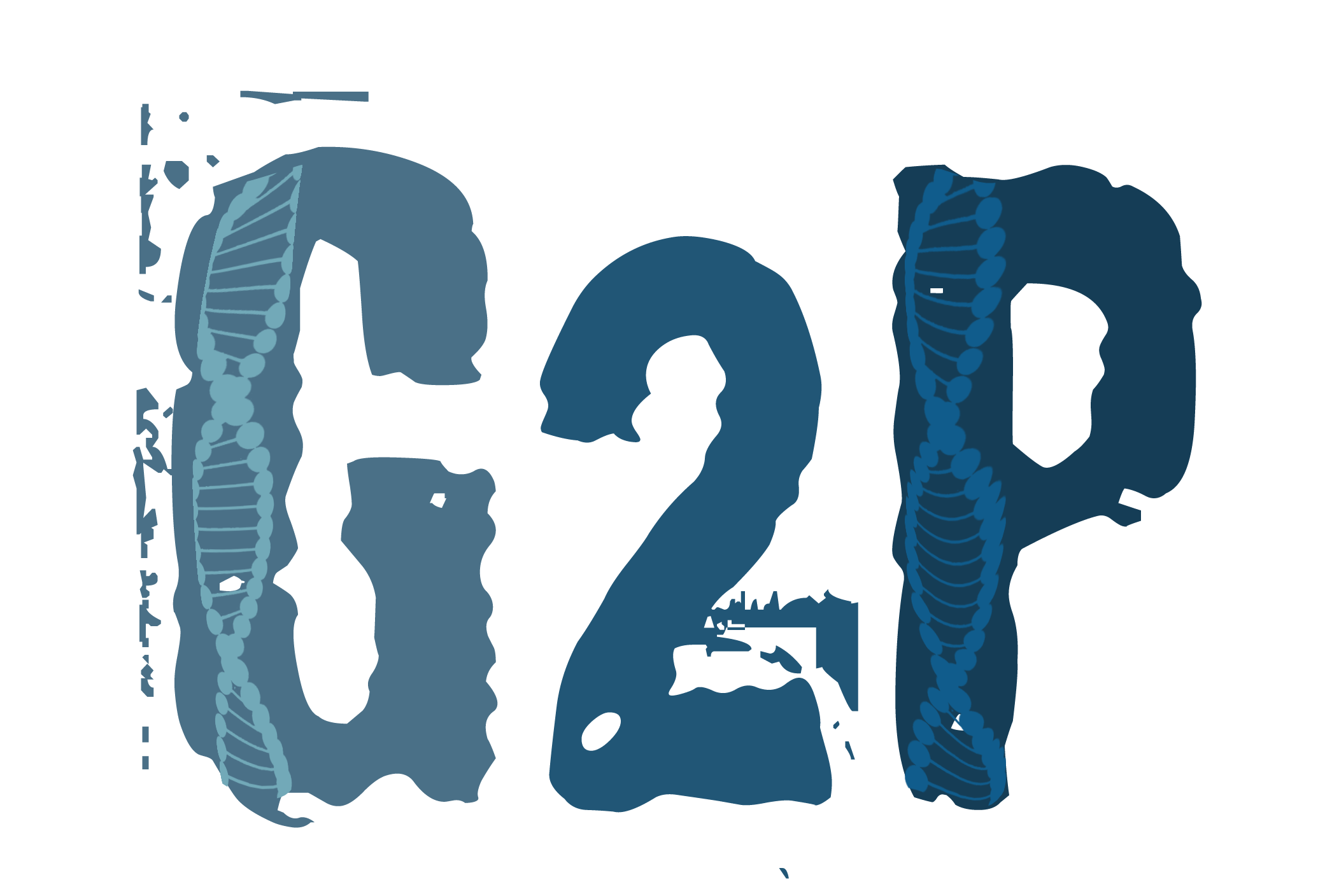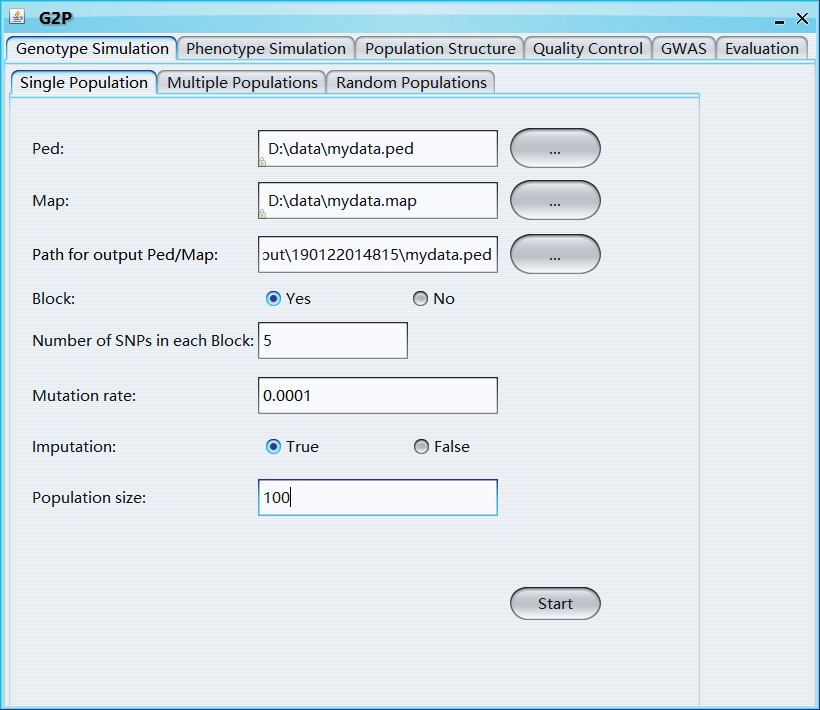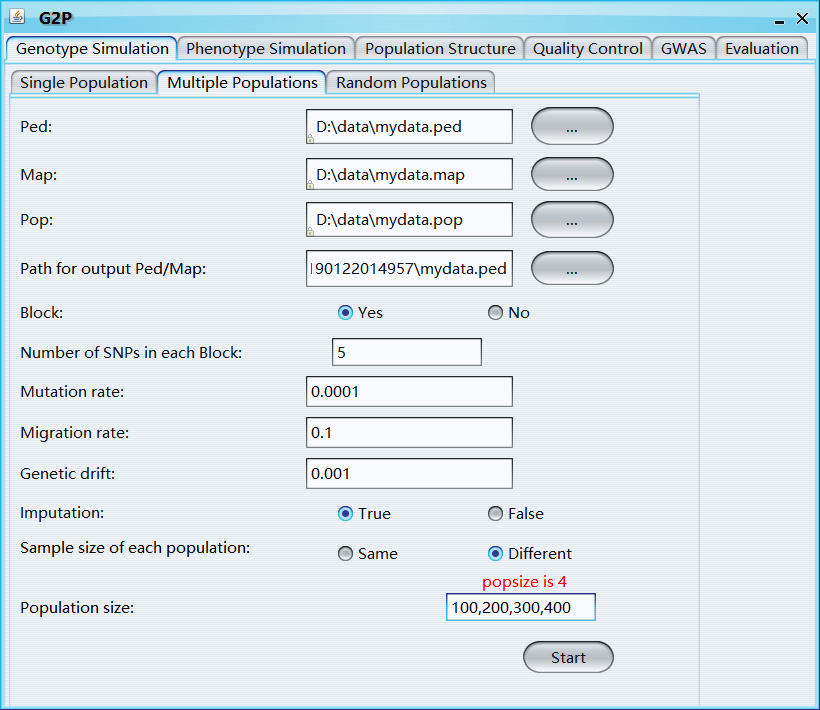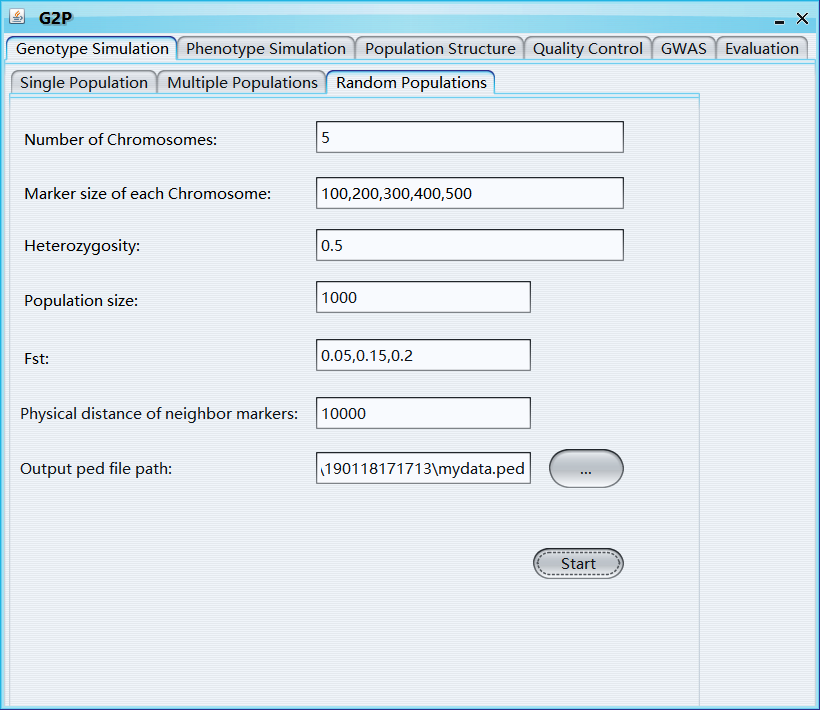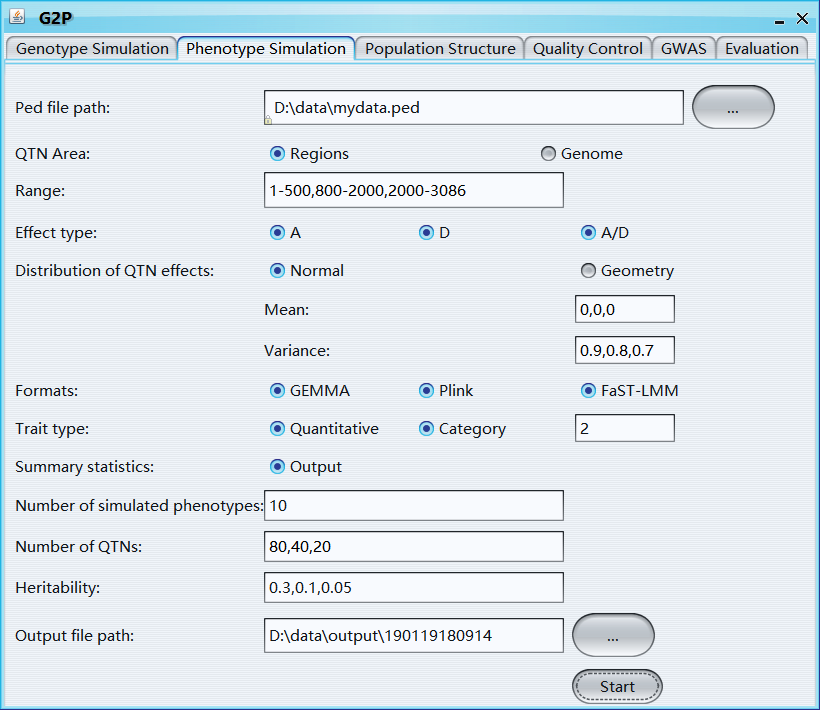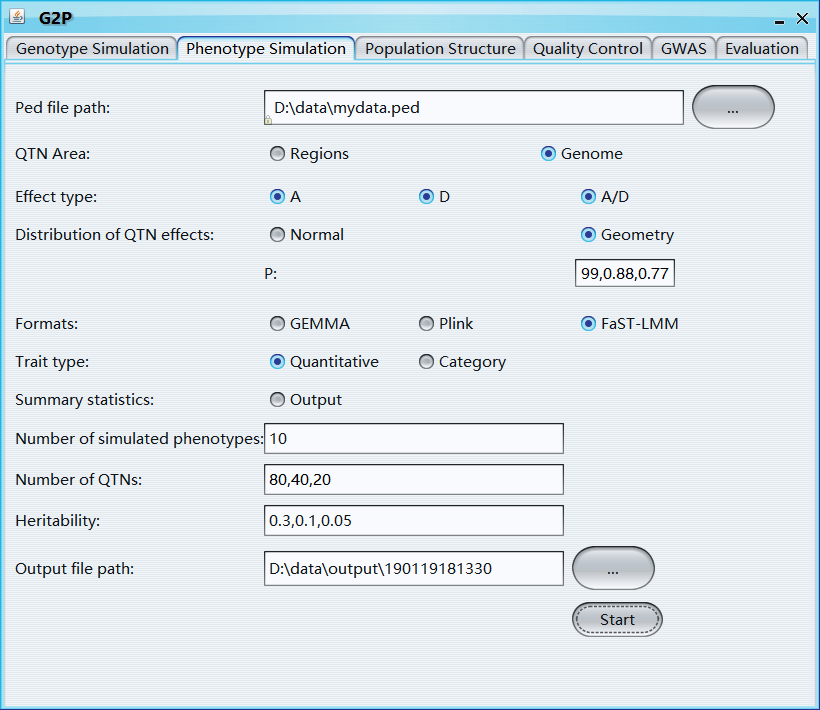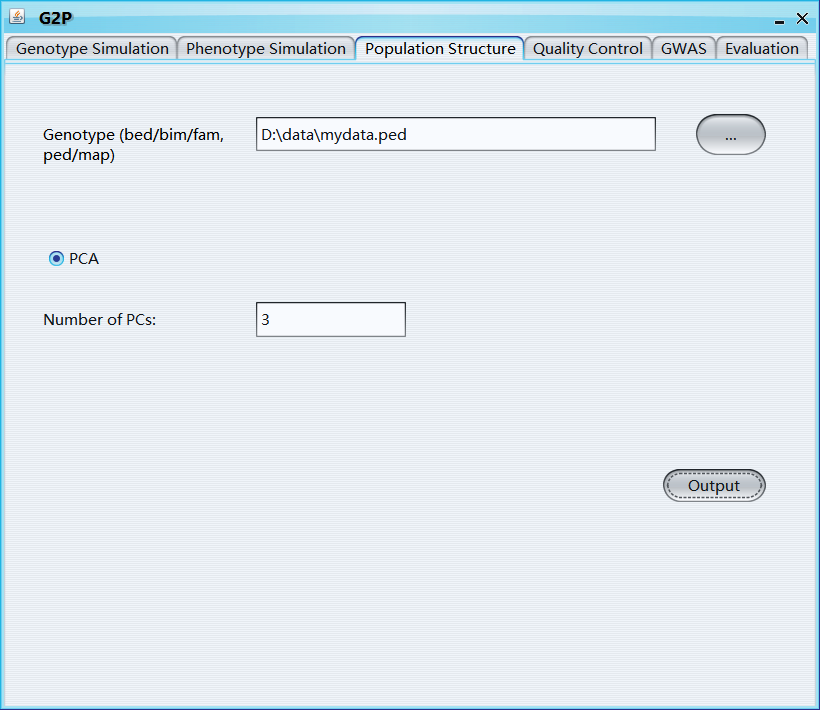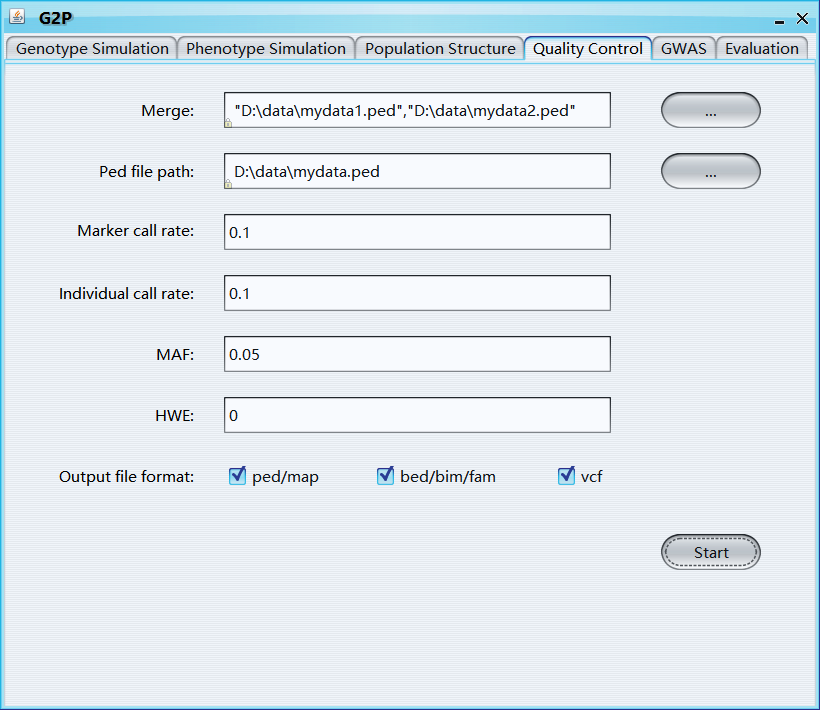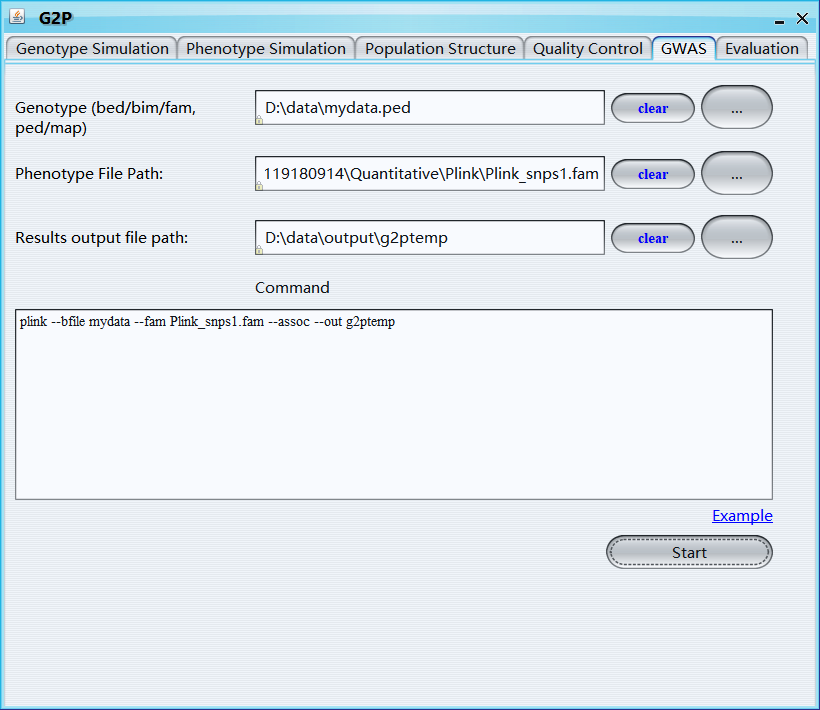A Genome-Wide-Association-Study Simulation Tool for Genotype Simulation, Phenotype Simulation, and Power Evaluation
More abundant simulation functions could be referred to our newly developed package SIMER for simulation of life science and breeding
You Tang and Xiaolei Liu
[xiaoleiliu@mail.hzau.edu.cn](Xiaolei Liu)
- Installation
- Data Preparation
- Genotype Simulation
- Phenotype Simulation
- Population Structure
- Quality Control
- GWAS
- Method Evaluation
- FAQ and Hints
back to top
JDK1.8 should be installed and environment variables must be configured before using G2P (http://www.oracle.com/technetwork/java/javase/downloads/jdk8-downloads-2133151.html)
back to top
GUI
Download all files from https://github.com/XiaoleiLiuBio/G2P/tree/master/gG2P_win_64 and double click the .jar file
Pipeline
Download all files from https://github.com/XiaoleiLiuBio/G2P/tree/master/kG2P_win_64
back to top
GUI
Download all files from https://github.com/XiaoleiLiuBio/G2P/tree/master/gG2P_mac and double click the .jar file
Pipeline
Download all files from https://github.com/XiaoleiLiuBio/G2P/tree/master/kG2P_mac
permission setting
$ chmod 777 gemma oldplink plink back to top
GUI
Download all files from https://github.com/XiaoleiLiuBio/G2P/tree/master/gG2P_linux_x86_64
and run
$ Java -jar gG2P.jar Pipeline
Download all files from https://github.com/XiaoleiLiuBio/G2P/tree/master/kG2P_linux_x86_64
permission setting
$ chmod 777 gemma oldplink plink All files should be prepared with the same prefix
details see http://zzz.bwh.harvard.edu/plink/data.shtml#ped
back to top
| Family ID | Individual ID | Father ID | Mother ID | Sex | Trait | marker 1 | marker 2 | marker 3 | marker 4 | marker 5 | marker 6 |
|---|---|---|---|---|---|---|---|---|---|---|---|
| 1 | 33-16 | 0 | 0 | 0 | 2 | 0 0 | A A | A A | A G | A G | A G |
| 1 | 38-11 | 0 | 0 | 0 | 2 | 0 0 | A G | A G | A A | A G | A G |
| 1 | 4226 | 0 | 0 | 0 | 2 | 0 0 | A G | A A | A A | A G | A G |
| 1 | 4722 | 0 | 0 | 0 | 2 | 0 0 | A G | A G | A A | A G | A G |
| 1 | A188 | 0 | 0 | 0 | 2 | 0 0 | A A | A A | A A | A G | A G |
| 1 | A214N | 0 | 0 | 0 | 2 | 0 0 | A G | A A | A G | A A | A G |
| 1 | A239 | 0 | 0 | 0 | 2 | 0 0 | A A | A A | A G | A G | A A |
| Family ID | Individual ID | Father ID | Mother ID | Sex | Trait | marker 1 | marker 2 | marker 3 | marker 4 | marker 5 | marker 6 |
|---|---|---|---|---|---|---|---|---|---|---|---|
| 1 | 33-16 | 0 | 0 | 0 | 2 | 0 0 | 1 1 | 1 1 | 1 3 | 1 3 | 1 3 |
| 1 | 38-11 | 0 | 0 | 0 | 2 | 0 0 | 1 3 | 1 3 | 1 1 | 1 3 | 1 3 |
| 1 | 4226 | 0 | 0 | 0 | 2 | 0 0 | 1 3 | 1 1 | 1 1 | 1 3 | 1 3 |
| 1 | 4722 | 0 | 0 | 0 | 2 | 0 0 | 1 3 | 1 3 | 1 1 | 1 3 | 1 3 |
| 1 | A188 | 0 | 0 | 0 | 2 | 0 0 | 1 1 | 1 1 | 1 1 | 1 3 | 1 3 |
| 1 | A214N | 0 | 0 | 0 | 2 | 0 0 | 1 3 | 1 1 | 1 3 | 1 1 | 1 3 |
| 1 | A239 | 0 | 0 | 0 | 2 | 0 0 | 1 1 | 1 1 | 1 3 | 1 3 | 1 1 |
details see http://zzz.bwh.harvard.edu/plink/data.shtml#map
back to top
| Chromosome ID | Marker ID | Genetic Distance | Physical Distance |
|---|---|---|---|
| 1 | PZB00859.1 | 0 | 157104 |
| 1 | PZA01271.1 | 0 | 1947984 |
| 1 | PZA03613.2 | 0 | 2914066 |
| 1 | PZA03613.1 | 0 | 2914171 |
| 1 | PZA03614.2 | 0 | 2915078 |
| 1 | PZA03614.1 | 0 | 2915242 |
| 1 | PZA00258.3 | 0 | 2973508 |
back to top
new samples will be generated using samples within sub-population
| Sample ID | sub-Population ID |
|---|---|
| 33-16 | 1 |
| 38_11 | 1 |
| 4226 | 1 |
| 4722 | 2 |
| A188 | 2 |
| A214N | 2 |
| A239 | 2 |
| A272 | 2 |
| A441-5 | 2 |
| A554 | 3 |
| A556 | 3 |
| A6 | 3 |
| A619 | 3 |
back to top
each column represents simulated QTNs for each phenotype
| Phenotype 1 | Phenotype 2 | Phenotype 3 | Phenotype 4 | Phenotype 5 |
|---|---|---|---|---|
| 66 | 67 | 80 | 83 | 90 |
| 9 | 15 | 52 | 59 | 135 |
| 90 | 96 | 143 | 147 | 174 |
| 3 | 3 | 15 | 58 | 89 |
| 89 | 118 | 185 | 203 | 212 |
| 69 | 72 | 72 | 84 | 110 |
| 46 | 59 | 125 | 204 | 207 |
| 14 | 15 | 19 | 29 | 39 |
| 9 | 23 | 65 | 111 | 131 |
| 19 | 52 | 74 | 179 | 194 |
Ped: ped file
Map: map file
Path for output Ped/Map: path for output ped and map file
Block: Yes or No, if "Yes", the whole genome will be divided into blocks and shuffled to generate new samples
Number of SNPs in each block: Number of SNPs in each block
Mutation rate: the frequency of new mutations
Imputation: if TRUE, major allele will be used to impute missing values
Population size: simulated sample size
java -jar kG2P.jar --ped D:\data\AG.ped --map D:\data\AG.map --outgen D:\data\output --rn 100 --block 4 –impute
java -jar kG2P.jar --ped D:\data\AG.ped --map D:\data\AG.map --outgen D:\data\output --rn 100 --block 4 --mutation 0.0001 --impute
java -jar kG2P.jar --ped /root/data/AG.ped --map /root/data/AG.map --outgen /root/data/output --rn 100 --block 4 –impute
java -jar kG2P.jar --ped /root/data/AG.ped --map /root/data/AG.map --outgen /root/data/output --rn 100 --mutation 0.0001
java -jar kG2P.jar --ped D:\data\AG.ped --map D:\data\AG.map --outgen D:\data\output --rn 100 --block 4
java -jar kG2P.jar --ped D:\data\AG.ped --map D:\data\AG.map --outgen D:\data\output --rn 100 --impute
java -jar kG2P.jar --ped D:\data\AG.ped --map D:\data\AG.map --outgen D:\data\output --rn 100
java -jar kG2P.jar --ped D:\data\AG.ped --map D:\data\AG.map --outgen D:\data\output --rn 100 --mutation 0.0001
jar: executive software
ped: ped file
map: map file
outgen: output path
block: number of SNPs in each block
rn: simulated sample size
impute: if 'impute' is added, major allele will be used to impute missing value
mutation: the frequency of new mutations
Ped: ped file
Map: map file
Pop: pop file
Path for output Ped/Map: path for output ped and map file
Block: Yes, or No, if "Yes", the whole genome will be divided into blocks and shuffled to generate new samples
Number of SNPs in each block: Number of SNPs in each block
Mutation rate: the frequency of new mutations
Migration rate: the ratio of immigrants (or emigrants) for each group
Genetic drift: is the change in the frequency of an existing gene variant (allele) in a population due to random sampling of organisms
Imputation: if TRUE, major allele will be used to impute missing values
Sample size of each population: sample size of each newly simulated population
Population size: number or vector, simulated sample size
java -jar kG2P.jar --ped D:\data\AG.ped –map D:\data\AG.map --pop D:\data\AG.pop --outgen D:\data\output --block 4 --rn 100
java -jar kG2P.jar --ped D:\data\AG.ped --map D:\data\AG.map --pop D:\data\AG.pop --outgen D:\data\output --block 4 --rn 100 --mutation 0.0001 --mig 0.1 --genetic 0.001
java -jar kG2P.jar --ped /root/data/AG.ped --map /root/data/AG.map --pop /root/data/AG.pop --outgen /root/data/output --impute --block 4 --rn 100
java -jar kG2P.jar --ped /root/data/AG.ped --map /root/data/AG.map --pop /root/data/AG.pop --outgen /root/data/output --rn 100 --mutation 0.0001 --mig 0.1 --genetic 0.001
java -jar kG2P.jar --ped /root/data/AG.ped --map /root/data/AG.map --pop /root/data/AG.pop --outgen /root/data/output --rn 100 --genetic 0.001
java -jar kG2P.jar --ped D:\data\AG.ped --map D:\data\AG.map --pop D:\data\AG.pop --outgen D:\data\output --block 4 --rn 100
java -jar kG2P.jar --ped D:\data\AG.ped --map D:\data\AG.map --pop D:\data\AG.pop --outgen D:\data\output --rn 100
java -jar kG2P.jar --ped D:\data\AG.ped --map D:\data\AG.map --pop D:\data\AG.pop --outgen D:\data\output --impute --rn 100
java -jar kG2P.jar --ped D:\data\AG.ped --map D:\data\AG.map --pop D:\data\AG.pop --outgen D:\data\output --impute --block 4 --rn 100,200,300,400
java -jar kG2P.jar --ped D:\data\AG.ped --map D:\data\AG.map --pop D:\data\AG.pop --outgen D:\data\output --block 4 --rn 100,200,300,400
java -jar kG2P.jar --ped D:\data\AG.ped --map D:\data\AG.map --pop D:\data\AG.pop --outgen D:\data\output --rn 100,200,300,400
java -jar kG2P.jar --ped D:\data\AG.ped --map D:\data\AG.map --pop D:\data\AG.pop --outgen D:\data\output --impute --rn 100,200,300,400
java -jar kG2P.jar --ped D:\data\AG.ped --map D:\data\AG.map --pop D:\data\AG.pop --outgen D:\data\output --rn 100 --mutation 0.0001 --mig 0.1 --genetic 0.001
java -jar kG2P.jar --ped D:\data\AG.ped --map D:\data\mydata.map --pop D:\data\mydata.pop --outgen D:\data\output –-rn 100 --genetic 0.003
jar: executive software
ped: ped file
map: map file
pop: pop file
outgen: output path
block: number of SNPs in each block
rn: simulated sample size
mutation: the frequency of new mutations
mig: the ratio of immigrants (or emigrants) for each group
genetic: genetic drift, which is the change in the frequency of an existing gene variant (allele) in a population due to random sampling of organisms
impute: if 'impute' is added, major allele will be used to impute missing values
Number of Chromosomes: total number of Chromosomes for each newly simulated sample
Marker size of each Chromosome: a vector, marker size of each Chromosome
Heterozygosity: average heterozygosity of all markers
Population size: Sample size of new generated population
Fst: fixation index
Physical distance of neighbor markers: Physical distance between neighbor markers
Output ped file path: output path of ped file
java -jar kG2P.jar --sample 100 --chr 5 --marker 100,200,300,400,500 --d 500 --outgen D:\data\output
java -jar kG2P.jar --sample 100,200,300 --chr 5 --marker 100,200,300,400,500 --d 500 --outgen D:\data\output --heter 0.5 --Fst 0.05,0.15,0.2
java -jar kG2P.jar --sample 100 --chr 5 --marker 100,200,300,400,500 --d 500 --outgen /root/data/output
java -jar kG2P.jar --sample 100,200,300 --chr 5 --marker 100,200,300,400,500 --d 500 --outgen /root/data/output --heter 0.5 --Fst 0.05,0.15,0.2
jar: executive software
sample: simulated sample size
chr: Number of Chromosomes
marker: SNP markers for each Chromosome
d: physical distance (base pairs) between nearby markers
outgen: output path
heter: average heterozygosity of all markers
Fst: fixation index
Ped file path: path of ped file
QTN area: the genomic area that used to select QTNs
Range: if 'QTN area' is 'Yes', 'range' can be used to set the 'QTN area'
Effect type: three options for QTN effect type, including A, A+D, A+D+A/D, A represents Additive effect and D represents Dominance effect
Distribution of QTN effects: two options, 'Normal' and 'Geometry'
Mean: mean value of the normal distribution, length of 'Mean' should be the same with 'Variance'
Variance: variance of the normal distribution
Formats: phenotype formats of 'GEMMA', 'Plink', and 'FaST-LMM' soft wares
Trait type: quantitative or category
Summary statistics: output the summary statistics information of simulated phenotypes, includes QTN ID, Chromosome, Physical Position, effects of additive, dominance, and additive-dominance interaction, and heritability
Number of simulated phenotypes: number of simulated phenotypes
Number of QTNs: number of QTNs, if it is a vector, effect of different QTN group will follow different distributions; The length of 'Number of QTNs', 'Mean', and 'Variance' should be same
Heritability: heritability, a vector with length equals to number of ‘Effect type’
Output file path: output file path
java -jar kG2P.jar --ped D:\data\AG.ped --outgen D:\data\output --rep 100 --dis geo 0.99 --h2 0.5 --nqtn 100 --QTNarea 1-500,1000-1500
java -jar kG2P.jar --ped D:\data\AG.ped --outgen D:\data\output --rep 10 --dis geo 0.99,0.88,0.77 --h2 0.3,0.1,0.05 --nqtn 80,40,20 --QTNarea 1-500,1000-1500 --effect A/D --category 2 --summary
java -jar kG2P.jar --ped /root/data/AG.ped --outgen /root/data/output --rep 100 --dis geo 0.99 --h2 0.5 --nqtn 100 --QTNarea 1-500,1000-1500
java -jar kG2P.jar --ped D:\data\AG.ped --outgen D:\data\Part2out --rep 100 --dis geo 0.99 --h2 0.5 --nqtn 100
java -jar .\kG2P.jar --ped D:\data\AG.ped --outgen D:\data\output --rep 10 --dis geo 0.99,0.88 --h2 0.5 --nqtn 10,20 --QTNarea 1-500,1000-1500
java -jar KG2P.jar --ped D:\data\AG.ped --outgen D:\data\Part2out --rep 100 --dis nor --m 0,0.1 --v 0.99,0.98 --h2 0.5 --nqtn 10,20 --QTNarea 1-500,1000-1500
java -jar kG2P.jar --ped /root/data/AG.ped --outgen /root/data/output --rep 10 --dis geo 0.99,0.88 --h2 0.3,0.1 --nqtn 80,40 --effect D --category 4
java -jar kG2P.jar --ped /root/data/AG.ped --outgen /root/data/output --rep 10 --dis nor --h2 0.5 --m 0 --v 0.99 --nqtn 100 --effect A --category 2
java -jar kG2P.jar --ped /root/data/AG.ped --outgen /root/data/output --rep 10 --dis nor --h2 0.3 --m 0.2 --v 0.88 --nqtn 100 –summary
java -jar kG2P.jar --ped /root/data/AG.ped --outgen /root/data/output --rep 10 --dis nor --h2 0.5 --m 0 --v 0.99 --nqtn 100 --effect A/D --category 2
jar: executive software
rep: number of simulated phenotypes
dis: distribution of QTN effects, two options, 'nor' and 'geo'
m: mean value of the normal distribution
v: variance of the normal distribution
QTNarea: the genomic area that used to select QTNs
h2: heritability
nqtn: number of QTNs, if it is a vector, the effects of different QTN groups will follow different distributions, and the length of nqtn, m, and v should be same
effect: three options for QTN effect type, including A (A), A+D (D), A+D+A/D (A/D)
category: number of categories for simulated phenotypes
Genotype (bed/bim/fam, ped/map): select genotype file
PCA: select if you want to calculate principle components
Number of PCs: number of PCs will be calculated and generated
Kinship: select if you want to calculate Kinship matrix
java -jar kG2P.jar --pre "plink --bfile D:\data\AG --pca 3 --out D:\data\AG"
java -jar kG2P.jar --pre "./plink --bfile /root/data/AG --pca 3 --out /root/data/AG"
java -jar kG2P.jar --pre "./gemma -bfile /root/data/AG -gk -o testgemma"
jar: executive software
pre: pipeline of the software you want to use, attention that the software should be put in the same path as kG2P.jar
Merge: merge multiple selected genotype file
Ped file path: path of ped file
Marker call rate: filters out all markers with missing call rates exceeding the provided value
Individual call rate: filters out all individuals with missing call rates exceeding the provided value
MAF: threshold of minor allele frequency
HWE: Hardy-Weinberg equilibrium test p-value threshold
Output file format: the format of output genotype file
java -jar kG2P.jar --mergePED D:\data\mydata1.ped D:\data\mydata2.ped
java -jar kG2P.jar --mergePED /root/data/mydata1.ped /root/data/mydat2.ped
java -jar .\kG2P.jar --ped "D:\data\mydata.ped" --geno 0.1 --mind 0.1 --maf 0.05 --hwe 0 --format pbv
java -jar .\kG2P.jar --ped "D:\data\mydata.ped" --geno 0.1 --mind 0.1 --maf 0.05 --hwe 0 --format b
java -jar ./kG2P.jar --ped /root/data/mydata.ped --geno 0.1 --mind 0.1 --maf 0.05 --hwe 0 --format pbv
java -jar kG2P.jar --ped /root/data/mydata.ped --geno 0.1 --mind 0.1 --maf 0.08 --hwe 0 --format bv
jar: executive software
mergePED: merge multiple genotype files prepared in ped format
geno: filters out all markers with missing call rates exceeding the provided value
mind: filters out all individuals with missing call rates exceeding the provided value
maf: threshold of minor allele frequency
hwe: Hardy-Weinberg equilibrium test p-value threshold
format: three options, including p(ped/map), b(bed/bim/fam), and v(vcf)
Genotype (bed/bim/fam, ped/map): select genotype file
Phenotype file path: select the first phenotype file, all phenotypes in the same path will be analyzed one by one; name of the phenotype file must include a continuous order number, e.g., 'phenotype1.txt', 'phenotype2.txt', 'phenotype3.txt'
Results output file path: select output file path
Command: command for running gwas of the first phenotype, user-specific covariates files and kinship file can be also included in the command line, note that the output file name must be ‘g2ptemp’
R package _ Windows
Take FarmCPU (an R package) as an example:
Download and install essential packages for FarmCPU from http://www.zzlab.net/FarmCPU/index.html;
If the script for running FarmCPU is stored in Demo_script.R and the path of Rscript.exe is "E:\R\R-3.4.0\bin\x64\Rscript.exe", the command line should be written as: E:\R\R-3.4.0\bin\x64\Rscript.exe Demo_script.R
java -jar kG2P.jar --GWAS "plink --bfile D:\data\AG --fam D:\data\out\171104010413\Plink\Plink_snps1.fam --assoc --out D:\data\g2ptemp" --sp Plink_snps1.fam
java -jar kG2P.jar --GWAS "./plink --bfile /root/data/AG --fam /root/data/output/171104010413/Plink/Plink_snps1.fam --assoc --out /root/data/g2ptemp" --sp Plink_snps1.fam
java -jar kG2P.jar --GWAS "./gemma -bfile /root/data/AG -p /root/data/out/171104030401/GEMMA/GEMMA_phenotype1.txt -k /root/output/testgemma.cXX.txt -lmm 4 -o g2ptemp" --sp GEMMA_phenotype1.txt
jar: executive software
GWAS: command line used for running gwas of the first phenotype
sp: the first phenotype file, the file path is not needed
jar: executive software
GWAS: command line used for running gwas of the first phenotype
sp: the first phenotype file, the file path is not needed
Map file: map file
QTN file: qtn file
GWAS result files path: path of gwas results
Column number of P values: column number of P values
Window size: A window is considered to be identified if a positive genetic marker is detected within the window
Output file path: output path of power/fdr evaluation results
java -jar kG2P.jar --map D:\data\AG.map --qtn D:\data\output\170106093742\qtn\test.qtn --gwas D:\data\output\Plink_snps1.qassoc --pv 9 --out D:\data\output
java -jar kG2P.jar --map D:\data\AG.map --qtn D:\oldoutput\190120151328\qtn\test.qtn --gwas D:\oldoutput\Plink_snps1.qassoc --pv 9 --out D:\data\output --WS 2,2000,200000,200000000
java -jar kG2P.jar --map /root/data/AG.map --qtn /root/data/output/171104030401/qtn/test.qtn --gwas /root/data/output/Plink_snps1.qassoc --pv 9 --out /root/data/output
java -jar kG2P.jar --map /root/data/AG.map --qtn /root/data/output/171104030401/qtn/test.qtn --gwas /root/data/output/Plink_snps1.qassoc --pv 9 --out /root/data/output --WS 3,300,3000,30000,300000,3000000
java -jar kG2P.jar --map /root/data/AG.map --qtn /root/data/output/171104030401/qtn/test.qtn --gwas /root/output/GEMMA_phenotype1.assoc.txt --pv 9 --out /root/data/output
jar: executive software
map: map file
qtn: qtn file
gwas: the first gwas result file, there is a one-to-one mapping between gwas result files and columns in the qtn file
pv: column number of P values
out: output file path
WS: Window size, a window is considered to be identified if a positive genetic marker is detected within the window
For G2P: Please cite: You Tang, Xiaolei Liu; G2P: A Genome-Wide-Association-Study Simulation Tool for Genotype Simulation, Phenotype Simulation, and Power Evaluation, Bioinformatics, btz126, https://doi.org/10.1093/bioinformatics/btz126
For principle components analysis:
if you use plink, please also cite: Purcell S, et.al. "PLINK: A Tool Set for Whole-Genome Association and Population-Based Linkage Analyses." American Journal of Human Genetics, 81.3(2007):559-575.
For calculating kinship matrix:
if you use gemma, please also cite: Zhou, X., et.al. "Genome-wide Efficient Mixed Model Analysis for Association Studies." Nature Genetics, 44.7(2012):821.
Please cite all soft wares you used for GWAS and evaluation!


